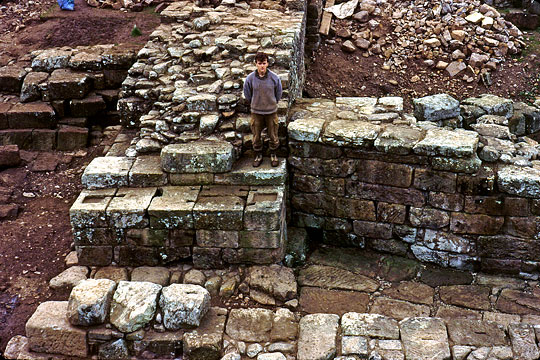Research on Willowford Wall, Turrets and Bridge
Excavations were carried out at the bridge and turrets in 1923–4, 1940 and 1984–5, but further work could reveal much about the relationship between the various elements of Hadrian’s Wall.

Previous Excavations and Research
The excavations of the bridge abutment by RC Shaw in 1923–4 uncovered the later tower and bridge abutment. He also excavated turrets 48a and 48b.[1]
FG Simpson recorded some additional features in 1940 when the remains were being consolidated, including the foundations of two bridge piers.[2]
In 1984–5 the bridge remains were recorded in detail and partly re-excavated by Neil Holbrook.[3]
Further Research Potential and Priorities
- Geophysical survey could reveal much about the relationship of the various elements of the Wall system, especially in the vicinity of turret 48a where the Vallum and the Wall are very close to each other.
- Although all the building stones for the bridge, turrets and this sector of the Wall are now fully published,[4] a fuller analysis of their overall significance is urgently required.
- For general research priorities connected with the Hadrian’s Wall bridges see Frontiers of Knowledge: Agenda and Strategy, 3.5.9.
READ MORE ABOUT WILLOWFORD WALL, TURRETS AND BRIDGE
Footnotes
1. RC Shaw, ‘Excavations at Willowford’, Transactions of the Cumberland and Westmorland Antiquarian and Archaeological Society, 2nd series, 26 (1926), 429–506.
2. Simpson, FG, ‘Proceedings’, Transactions of the Cumberland and Westmorland Antiquarian and Archaeological Society, 2nd series, 41 (1941), 214.
3. P Bidwell and N Holbrook, Hadrian’s Wall Bridges, English Heritage Archaeological Report 9 (London, 1989).
4. RG Collingwood and RP Wright, The Roman Inscriptions of Britain, vol 1: Inscriptions on Stone (Oxford, 1965), nos. 1859–1897; RSO Tomlin, RP Wright and MWC Hassall, The Roman Inscriptions of Britain, vol 3: Inscriptions on Stone 1955–2006 (Oxford, 2009), nos. 3402–3414.